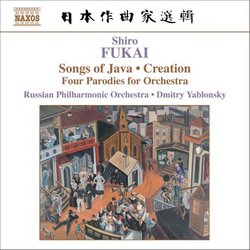| All Artists: Shiro Fukai, Dmitry Yablonsky, Russian Philharmonic Orchestra Title: Shiro Fukai: Songs of Java; Creation; Four Parodies for Orchestra Members Wishing: 0 Total Copies: 0 Label: Naxos Original Release Date: 1/1/2006 Re-Release Date: 2/21/2006 Genre: Classical Styles: Ballets & Dances, Ballets, Symphonies Number of Discs: 1 SwapaCD Credits: 1 UPC: 747313268825 |
Search - Shiro Fukai, Dmitry Yablonsky, Russian Philharmonic Orchestra :: Shiro Fukai: Songs of Java; Creation; Four Parodies for Orchestra
 | Shiro Fukai, Dmitry Yablonsky, Russian Philharmonic Orchestra Shiro Fukai: Songs of Java; Creation; Four Parodies for Orchestra Genre: Classical
|
Larger Image |
CD Details |
CD ReviewsA Japanese Composer Influenced Deeply by the 20th-C. French J Scott Morrison | Middlebury VT, USA | 04/09/2006 (3 out of 5 stars) "The name of Shiro Fukai (1907-1959) is barely known in the West. Born in the far north of Japan and in ill-health as a young man, he had the leisure to memorize scores he was able to obtain from a library. He eventually studied with the French-influenced composer Meiro Sugahara, only ten years his senior. He tended not to be particularly interested in Japanese musical influences, preferring to imitate music by Ravel and others. The 'Four Parodies for Orchestra' are imitative of the music of and dedicated to Falla, Stravinsky, Ravel and Roussel. By far the most successful is the limpid Ravel movement (No. 3) which features a very Ravelian flute solo that is reminiscent of the second movement of Ravel's G major piano concerto. 'Création' is a 1940 ballet that sounds more like Roussel. In its three movements it supposedly limns 'The Birth of the Gods,' 'The Birth of Living Things' and 'The Birth of Humans.' It all sounds rather tame and generic to me, frankly.
By far the most satisfying piece here is a self-acknowledged knock-off of Ravel's 'Boléro' called 'Chantes de Java' ('Songs of Java') which features the kind of repetitive theme carried through crescendo and decrescendo of the earlier work. We are told that this work is Fukai's most-played orchestral score and it is easy to hear why. It's a crowd pleaser and is played nicely here by the Russian Philharmonic under Dmitry Yablonsky. All in all, though, this is not particularly distinguished music. The orchestrations sound tentative, thematic material is not especially memorable and except for the performance of the 'Chantes de Java' the orchestral playing sounds under-rehearsed. Add to that the very short timing -- 47:10 -- and a recommendation cannot be forthcoming. For the curious only. Scott Morrison" |

 Track Listings (8) - Disc #1
Track Listings (8) - Disc #1